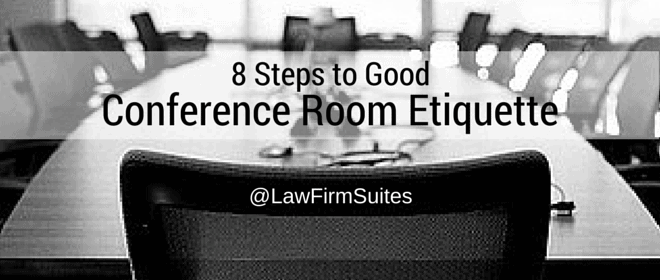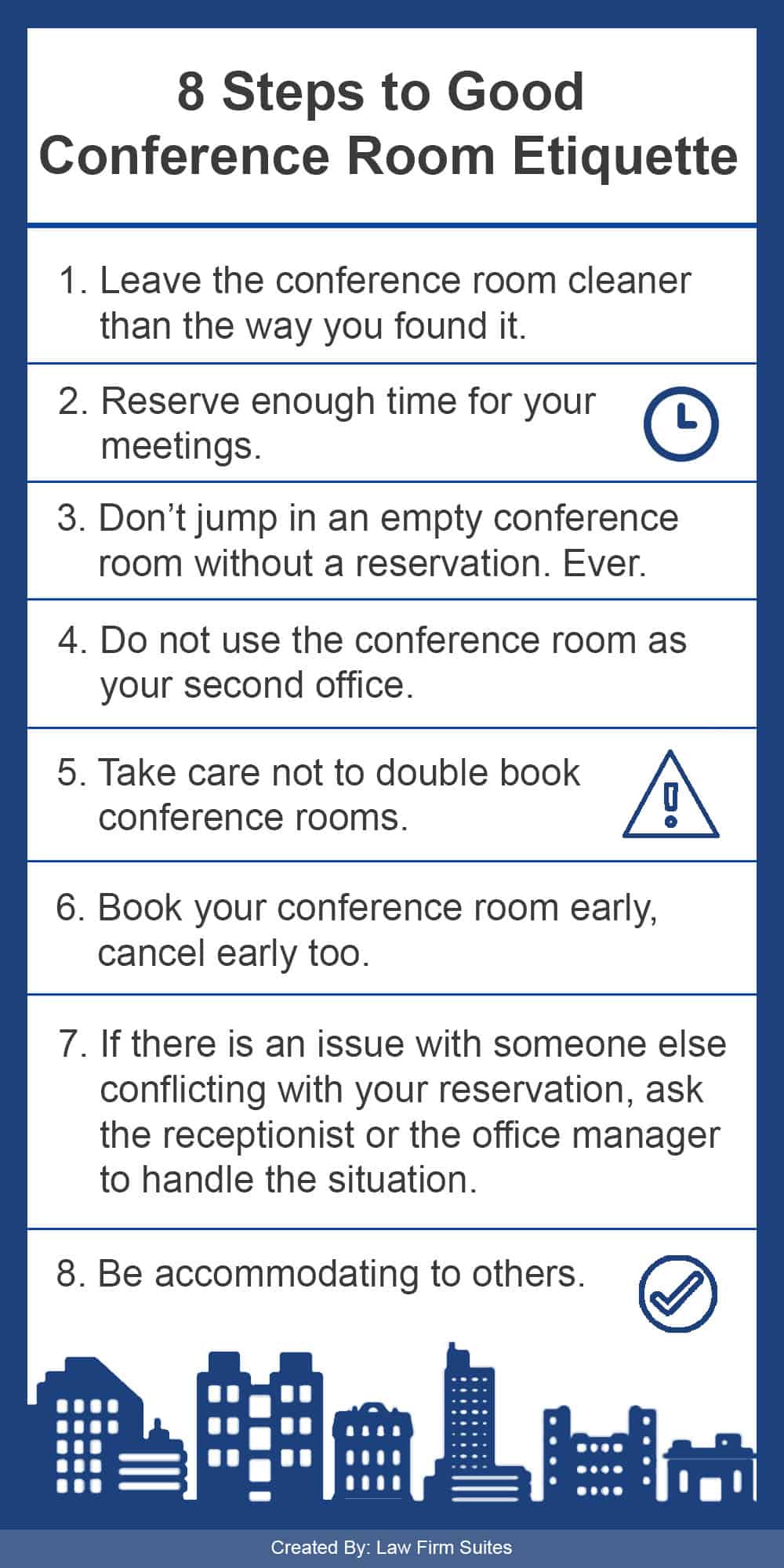In addition to client referrals and co-counsel opportunities, abundant conference room access is one of the many perks of shared law office space. However, fail to adhere to proper conference room etiquette, and you will quickly find yourself off the shortlist for those other opportunities.
The meeting room is an indispensable tool for practicing law, and the availability of quality conference room facilities is often one of the key perks of sharing office space with other attorneys.
One of the many perks of #sharedlawoffice space is having access to quality conference rooms Click To TweetWhen it comes to conference rooms, rude behavior has a profoundly negative effect on all the members of your shared office space community. Be rude consistently, and your bad manners will erode the main benefit of sharing office space: client referrals.
When it comes to conference rooms, being a good suite-mate should be obvious – but as we have found over the years, that’s not always the case.
At Law Firm Suites, we have developed a set of “house rules” for conference room etiquette. Following these seven rules will keep you in the esteem of your colleagues.
1. Leave the conference room cleaner than the way you found it.
No one wants to clean up someone else’s mess. Clean up after yourself and your guests. If you cannot clean up or do not have ready access to cleaning supplies, inform the receptionist or the operator of the space. Whatever you do, never leave the mess for the next guy to clean.
2. Reserve enough time for your meetings.
It’s bad business for everyone to have your meeting barged in on by the person with the next reservation slot. Schedule enough conference room time for your meetings. Failing to do so may result in a situation where you will be asked to leave the conference room and there may be no other place available for your meeting, putting everyone in an extremely uncomfortable situation.
3. Don’t jump in an empty conference room without a reservation. Ever.
Most offices have a mechanism for reserving the conference room. Just because a conference room is empty does not mean you have carte blanche to use it without a reservation. Scheduling prevents sticky situations.
4. Do not use the conference room as your second office.
Sometimes it’s nice to spread your work out over a luxuriously large conference room table. And if you have the benefit of being the only lawyer in your office, go right ahead. However, if you share your office space with other attorneys, conference rooms are a finite resource. They should be used only for client and staff meetings, not for individual work that could be accomplished at your desk. If you need someplace to work other than your office, arrangements can often be made to rent an empty office, even temporarily.
5. Take care not to double book conference rooms.
Read your conference room reservation calendar carefully and make sure that you do not inadvertently double book conference rooms. If you accidentally double book, cancel the extra reservation immediately.
6. Book your conference room early, cancel early too.
As soon as you schedule a meeting make your conference room reservation. In shared office space, conference rooms are usually available if you reserve them a few days in advance. If you wait until the day of your meeting, you may find yourself without access to a conference room. If your meeting gets cancelled, don’t forget to cancel your conference room reservation immediately.
7. If there is an issue with someone else conflicting with your reservation, ask the receptionist or the office manager to handle the situation.
Unless there are no other options, try not to handle a conflict yourself. This may lead to hard feelings between you and the other lawyer, which may jeopardize your working relationship. Have a receptionist or the office center manager be the “bad guy.”
8. Be accommodating.
If you have reserved a meeting for two in a conference room that seats 30, offer to move your meeting to a smaller space (or to your office if possible) if another lawyer needs the bigger space for a deposition or closing. The favor will come back to you the next time you need it.




on said:
Thanks for letting me know that it’s a good idea to reserve more time for a conference room than you may need so that you won’t run into any awkward situations where we may have to leave abruptly. My friends and I are planning to rent a conference room so we can pitch our business to some investors and I really think we should do our best to get this whole procedure right. We wouldn’t want to mess up or anything like that, so this article is quite helpful to entrepreneurs starting out like us. I’ll make sure to cover these points with my friends so that we’re all on the same page and we’ll be more likely to succeed in our meetings.